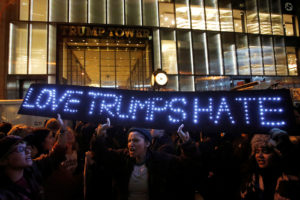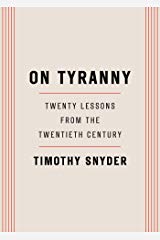Washington Post: ‘Bending Executive Branch”
We have been naive as a country not to believe him.
February 13, 2020He said he would destroy the institutions, and he is.
“Democracy dies in darkness.”
“Post-truth is pre-fascism.”
―
“The United States is so powerful that the only country capable of destroying her might be the United States herself, which means that the ultimate terrorist strategy would be to just leave the country along. That way, America’s ugliest partisan tendencies could emerge unimpeded by the unifying effects of war.”
-Sebastian Junger, On Homecoming and Belonging
Trump seeks to bend the executive branch as part of impeachment vendetta
“I’ve never seen so many prosecutors, including those who aren’t political or those who haven’t been following this situation closely, go to red alert so quickly,” said Joyce White Vance, a former U.S. attorney in the Obama administration. “The reason is this: If a president can meddle in a criminal case to help a friend, then there’s nothing that keeps him from meddling to harm someone he thinks is his enemy. That means that a president is fully above the law in the most dangerous kind of way. This is how democracies die.”
“Now he understands how to use the full powers of the presidency. The pearl-clutchers better get used to it.” – Former chief strategist Stephen K. Bannon
November 10, 2016:
Autocracy: Rules for Survival
https://www.nybooks.com/daily/2016/11/10/trump-election-autocracy-rules-for-survival/
“Thank you, my friends. Thank you. Thank you. We have lost. We have lost, and this is the last day of my political career, so I will say what must be said. We are standing at the edge of the abyss. Our political system, our society, our country itself are in greater danger than at any time in the last century and a half. The president-elect has made his intentions clear, and it would be immoral to pretend otherwise. We must band together right now to defend the laws, the institutions, and the ideals on which our country is based.”
That, or something like that, is what Hillary Clinton should have said on Wednesday. Instead, she said, resignedly,
We must accept this result and then look to the future. Donald Trump is going to be our president. We owe him an open mind and the chance to lead. Our constitutional democracy enshrines the peaceful transfer of power. We don’t just respect that. We cherish it. It also enshrines the rule of law; the principle [that] we are all equal in rights and dignity; freedom of worship and expression. We respect and cherish these values, too, and we must defend them.
Hours later, President Barack Obama was even more conciliatory:
We are now all rooting for his success in uniting and leading the country. The peaceful transition of power is one of the hallmarks of our democracy. And over the next few months, we are going to show that to the world….We have to remember that we’re actually all on one team.
[…]
The second falsehood is the pretense that America is starting from scratch and its president-elect is a tabula rasa. Or we are: “we owe him an open mind.” It was as though Donald Trump had not, in the course of his campaign, promised to deport US citizens, promised to create a system of surveillance targeted specifically at Muslim Americans, promised to build a wall on the border with Mexico, advocated war crimes, endorsed torture, and repeatedly threatened to jail Hillary Clinton herself. It was as though those statements and many more could be written off as so much campaign hyperbole and now that the campaign was over, Trump would be eager to become a regular, rule-abiding politician of the pre-Trump era.
Rule #1: Believe the autocrat. He means what he says. Whenever you find yourself thinking, or hear others claiming, that he is exaggerating, that is our innate tendency to reach for a rationalization. This will happen often: humans seem to have evolved to practice denial when confronted publicly with the unacceptable. Back in the 1930s, The New York Times assured its readers that Hitler’s anti-Semitism was all posture. More recently, the same newspaper made a telling choice between two statements made by Putin’s press secretary Dmitry Peskov following a police crackdown on protesters in Moscow: “The police acted mildly—I would have liked them to act more harshly” rather than those protesters’ “liver should have been spread all over the pavement.” Perhaps the journalists could not believe their ears. But they should—both in the Russian case, and in the American one. For all the admiration Trump has expressed for Putin, the two men are very different; if anything, there is even more reason to listen to everything Trump has said. He has no political establishment into which to fold himself following the campaign, and therefore no reason to shed his campaign rhetoric. On the contrary: it is now the establishment that is rushing to accommodate him—from the president, who met with him at the White House on Thursday, to the leaders of the Republican Party, who are discarding their long-held scruples to embrace his radical positions.
Rule #3: Institutions will not save you. It took Putin a year to take over the Russian media and four years to dismantle its electoral system; the judiciary collapsed unnoticed. The capture of institutions in Turkey has been carried out even faster, by a man once celebrated as the democrat to lead Turkey into the EU. Poland has in less than a year undone half of a quarter century’s accomplishments in building a constitutional democracy.
Of course, the United States has much stronger institutions than Germany did in the 1930s, or Russia does today. Both Clinton and Obama in their speeches stressed the importance and strength of these institutions. The problem, however, is that many of these institutions are enshrined in political culture rather than in law, and all of them—including the ones enshrined in law—depend on the good faith of all actors to fulfill their purpose and uphold the Constitution.
Rule #6: Remember the future. Nothing lasts forever. Donald Trump certainly will not, and Trumpism, to the extent that it is centered on Trump’s persona, will not either. Failure to imagine the future may have lost the Democrats this election. They offered no vision of the future to counterbalance Trump’s all-too-familiar white-populist vision of an imaginary past. They had also long ignored the strange and outdated institutions of American democracy that call out for reform—like the electoral college, which has now cost the Democratic Party two elections in which Republicans won with the minority of the popular vote. That should not be normal. But resistance—stubborn, uncompromising, outraged—should be.
“The Founding Fathers tried to protect us from the threat they knew, the tyranny that overcame ancient democracy. Today, our political order faces new threats, not unlike the totalitarianism of the twentieth century. We are no wiser than the Europeans who saw democracy yield to fascism, Nazism, or communism. Our one advantage is that we might learn from their experience.
On Tyranny is a call to arms and a guide to resistance, with invaluable ideas for how we can preserve our freedoms in the uncertain years to come.”
“The president is a nationalist, which is not at all the same thing as a patriot. A nationalist encourages us to be our worst, and then tells us that we are the best. A nationalist, “although endlessly brooding on power, victory, defeat, revenge,” wrote Orwell, tends to be “uninterested in what happens in the real world.” Nationalism is relativist, since the only truth is the resentment we feel when we contemplate others. As the novelist Danilo Kiš put it, nationalism “has no universal values, aesthetic or ethical.” A patriot, by contrast, wants the nation to live up to its ideals, which means asking us to be our best selves. A patriot must be concerned with the real world, which is the only place where his country can be loved and sustained. A patriot has universal values, standards by which he judges his nation, always wishing it well—and wishing that it would do better. Democracy”
“A nationalist will say that “it can’t happen here,” which is the first step toward disaster. A patriot says that it could happen here, but that we will stop it.”
“Modern tyranny is terror management. When the terrorist attack comes, remember that authoritarians exploit such events in order to consolidate power. The sudden disaster that requires the end of checks and balances, the dissolution of opposition parties, the suspension of freedom of expression, the right to a fair trial, and so on, is the oldest trick in the Hitlerian book. Do not fall for it.”
“The mistake is to assume that rulers who came to power through institutions cannot change or destroy those very institutions—even when that is exactly what they have announced that they will do.”
“More than half a century ago, the classic novels of totalitarianism warned of the domination of screens, the suppression of books, the narrowing of vocabularies, and the associated difficulties of thought. In Ray Bradbury’s Fahrenheit 451, published in 1953, firemen find and burn books while most citizens watch interactive television. In George Orwell’s 1984, published in 1949, books are banned and television is two-way, allowing the government to observe citizens at all times. In 1984, the language of visual media is highly constrained, to starve the public of the concepts needed to think about the present, remember the past, and consider the future. One of the regime’s projects is to limit the language further by eliminating ever more words with each edition of the official dictionary.”
“You submit to tyranny when you renounce the difference between what you want to hear and what is actually the case.”

